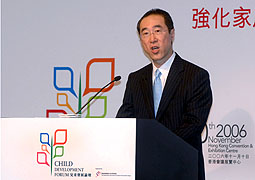
|
| Future plan: Financial Secretary Henry Tang says we need to equip our children, especially those with a disadvantaged background, to face challenges in a rapidly changing world. |
The proposed child development fund aims to help disadvantaged children and prevent intergenerational poverty, Financial Secretary Henry Tang says, adding the asset-building approach is worth careful study.
Speaking at the Child Development Forum today, Mr Tang said findings in a Commission on Poverty study showed 87% of children with fathers in the lowest earnings quintile group have actually moved up to higher earning groups in their adult life.
"However, the remaining 13% still need to be taken care of. We should take the view that no one should be left behind. We should mobilise very effort we can to ensure that everyone, whether their background is disadvantaged or not, should have access to opportunities that others do," he said.
Future challenges
"As we are transforming from an industrialised economy into an even more knowledge-based economy, we need to equip our children, especially those with a disadvantaged background, to face challenges in a rapidly changing world.
"In charting our way forward, we must also be aware of the limitations of simply providing income support without instilling the right attitudes and values in our younger generation."
The fund is based on the asset-based approach, developed since the 1990s. It emphasises that passive income support is not sufficient to motivate people to achieve self-reliance. People with their own assets and human capital will better plan and work for their own future.
Private sector
According to overseas experience, the Government can provide initial endowment to the fund. Children, their families, relatives and friends, as well as the private sector can also contribute. Additional contributions can be given to children from poor families.
Child development accounts have been introduced in the UK and the US. Individual development accounts have also been tried out in Taipei. For more details click here.
Mr Tang said the asset-based approach may be new to Hong Kong, but it will make a longer-term impact for the city to prevent intergenerational poverty and to enhance development of children, than just give them instant gratification.
"As far as resources are concerned, the Government as well as businesses should play a role. The Government will have to inject a certain amount of resources to get it started and also the important thing is to get the whole business community behind it so they will see that by investing in the next generation, they are contributing to the building up of a society asset, so that we will be more competitive going into the future."
|